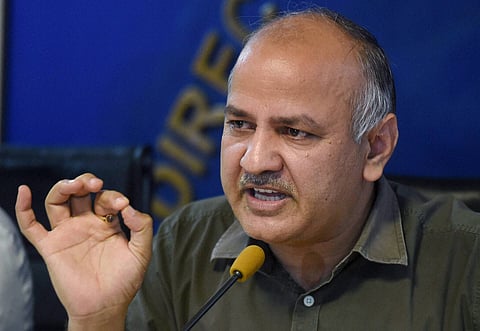

NEW DELHI: The Aam Aadmi Party government's innovations in education and healthcare in Delhi are a model for the rest of India, Deputy Chief Minister Manish Sisodia said.
In his address at the India Conference in Harvard University, he said that the 'Delhi model' focuses on raising the quality of human resources through access to high-quality education and healthcare.
"India has created several public institutions like the IITs, IIMs and AIIMS that produce professionals of high calibre. But all these institutes currently cater to one to five per cent of the population. For the rest of the 95 per cent, the system has completely collapsed. The situation is similar for healthcare as well.
"The country's development depends on the quality of its human resource, its people. And the quality of the human resource depends on their access to high-quality education and healthcare. Delhi's model of governance addresses this fundamental need," Sisodia said, according to an official release here on Sunday.
Showing pictures of dilapidated government schools, followed by pictures of Delhi government's newly constructed and renovated schools, he said: "In the first year we concentrated on improving the infrastructure of schools. Delhi government schools now have smart classrooms, clean and modern washrooms, air-conditioned assembly halls and some even have swimming pools and athletic tracks."
The government has built 8,000 new classrooms and 10,000 more were in "various stages of completion" and the school management committees have been "rejuvenated" and "empowered", Sisodia told a gathering consisting of Harvard students and academics besides eminent Indian businessmen and journalists.
He said apart from sending school teachers and principals at universities around the world, including Cambridge, Singapore and Harvard, the 'Teaching at the Right Level' model recommended by MIT's J-PAL has been implemented in Classes 6 to 8 to bridge children's learning deficits.
On his government's healthcare reforms, Sisodia underlined that In a country like India where people cannot afford high insurance premiums, "we need a health assurance model and not a health insurance mode".
"That is what we are developing through a three-tier healthcare programme. In the first tier is a re-imagined primary healthcare unit -- the 'Mohalla Clinic'. We are now building 25 Mohalla clinics at the cost of one erstwhile dispensary. With more than 160 such clinics functioning throughout the city, the patients who were crowding the large hospitals for primary care have been diverted to local clinics.
"The most striking part of this story is that in all of these clinics we provide consultation, diagnostic testing and medicines free of cost at a cost to the government of just over Rs 100 per patient. In contrast, a consultation at a large government hospital costs us more than Rs 1,000," Sisodia said.
Stressing policy-making is not "rocket science", he said: "It requires honest intent to find creative solutions".
"That is what Chief Minister Arvind Kejriwal's government has done in the last three years in Delhi. This change is not just needed in Delhi but throughout th" country," he said in his 40-minute keynote address.